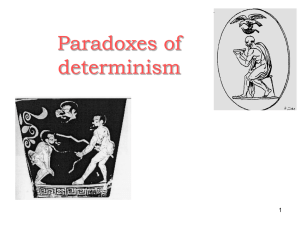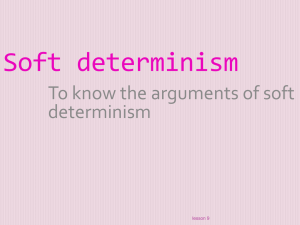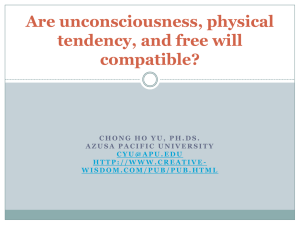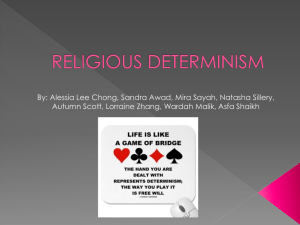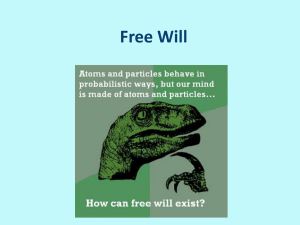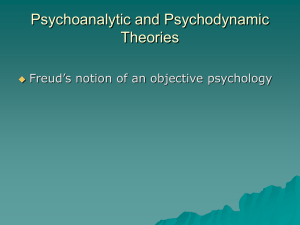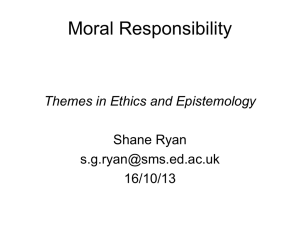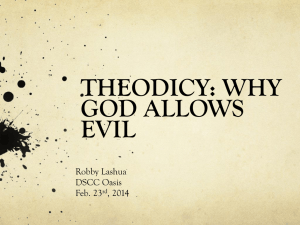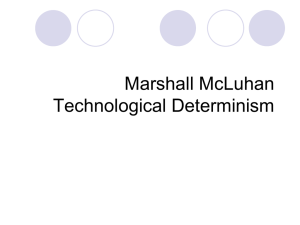Determinism
advertisement
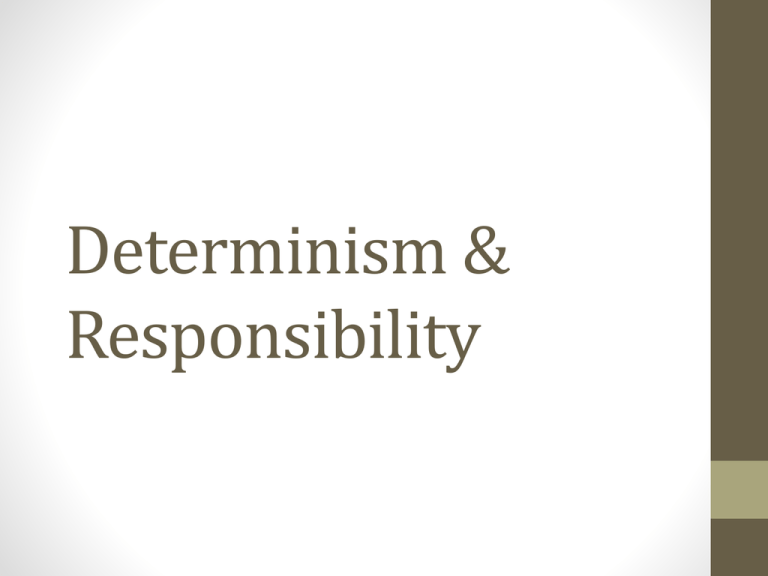
Determinism & Responsibility Determinism • Determinism - the concept that events within a given paradigm (i.e. human conscious) are bound by causality in such a way that any state (of an object or event) is completely, or at least to some large degree, determined by prior states. Determinism • Determinism - the concept that events within a given paradigm (i.e. human conscious) are bound by causality in such a way that any state (of an object or event) is completely, or at least to some large degree, determined by prior states. • Genetic Determinism the belief that genes determine physical and behavioral phenotypes. Determinism • Determinism - the concept that events within a given paradigm (i.e. human conscious) are bound by causality in such a way that any state (of an object or event) is completely, or at least to some large degree, determined by prior states. • Genetic Determinism the belief that genes determine physical and behavioral phenotypes. • Social Determinism - the hypothesis that social interactions and constructs alone determine individual behavior. Determinism • Determinism - the concept that events within a given paradigm (i.e. human conscious) are bound by causality in such a way that any state (of an object or event) is completely, or at least to some large degree, determined by prior states. • Genetic Determinism the belief that genes determine physical and behavioral phenotypes. • Social Determinism - the hypothesis that social interactions and constructs alone determine individual behavior. • Environmental Determinism - the view that the physical environment, rather than social conditions, determines culture. Determinism • Determinism - the concept that events within a given paradigm (i.e. human conscious) are bound by causality in such a way that any state (of an object or event) is completely, or at least to some large degree, determined by prior states. • Genetic Determinism the belief that genes determine physical and behavioral phenotypes. • Social Determinism - the hypothesis that social interactions and constructs alone determine individual behavior. • Environmental Determinism - the view that the physical environment, rather than social conditions, determines culture. • Biological Determinism - the hypothesis that biological factors such as an organism's individual genes completely determine how a system behaves or changes over time. Common misconceptions about genetic determinism • Genes alone determine human traits and behaviors. • GD doesn’t account for environmental influences. • example - when two monozygous twins living in different environments Epigenetics • Epigenetics - the study of heritable changes in phenotype or gene expression caused by mechanisms other than changes in the underlying DNA sequence. • Example – Cell division of a fertilized egg cell. The egg cell changes into different types of cells (muscle cells, blood cells, etc.) by activating some genes while inhibiting others. Free Will • Free Will - the ability make choices free from certain kinds of constraints (i.e. determinism). • Free will and determinism are largely believed to be incompatible ideas. • Compatibilist - belief that free will and determinism are compatible ideas. Free will may be defined in more philosophical terms. Free Will (Philosophical) • Chance and determination • Lack of physical restraint • Unpredictability • And many more… Free Will vs. Determinism Metaphysical libertarianism Concept of free will that requires the agent to be able to take more than one possible course of action under a given set of circumstances Non-physical mind overrides physical causality Soul is said to make decisions and override physical causality Indeterminism Alternating between chance and necessity Red circles represent mental states Blue circles represent physical states Arrows describe causal interaction Conflicts with Free Will • In a religious sense, free will implies that individual will and choices can coexist with an omnipotent divinity. Conscious Will • Daniel Wegner - Human perception of conscious control is an illusion • Authorship processing • the perception of conscious will is not connected to the execution of actual behaviors, instead through an intricate mental process • Wegner was able to manipulate a person to show that: • People will often experience conscious will over behaviors that they haven’t caused • People can be led to experience a lack of will over behaviors that they did cause • Wegner claims his studies are about mechanisms for perceptions of control, not for control itself Neuroscience of free will Benjamin Libet (1980) • Wrist Flicking • Monitor Brain activity vs. subjects reported conscious time • Results: difference of ~ half second Further Research (2008) Picking left or Right Results: Scientist able to predict (with 60% accuracy) 10 seconds before the subject became aware of having made that choice Questions of Ethical Concern Who/what should be held accountable for one’s actions? And to what degree? Moral responsibility – It is of debate whether free will is held morally accountable for an individuals actions, or is blame assigned to factors of determinism (Alcoholism, Domestic violence, etc.). Legal responsibility – One is legally responsible for their moral actions. Responsibility Blame and praise • “Don’t pick them up, don’t lay them down” – Maya Angelou • “…one deserves no credit for anything. Nor ought one to blame others.” – Darwin • “To tell people they are not to blame for past mistakes is to make future mistakes more likely.” – Wright More moral dilemmas homosexuality (victimless crime) divorce etc. What are your thoughts? Questions?

